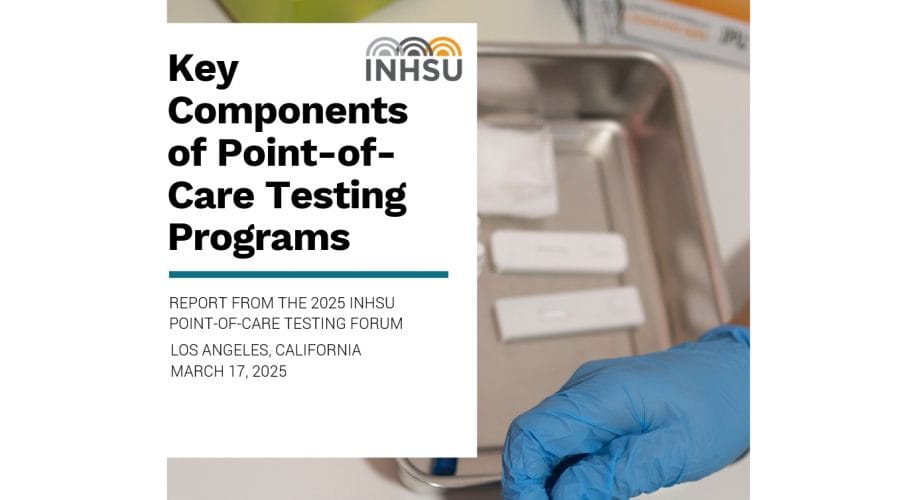 Credit: INHSU
Credit: INHSUThe International Network on Hepatitis in Substance Users (INHSU) released a report, Key Components of Point-of-Care Testing Programs, outlining six areas that must work together if point-of-care testing is to be implemented effectively and to scale.
The report is based on discussions at the 2025 INHSU Point-of-Care Testing Forum at the Global Hepatitis Summit, held in Los Angeles, USA on 18-21 March 2025, where more than 80 international researchers, clinicians, community representatives, and policymakers examined what it really takes to expand access to hepatitis C testing in diverse, real-world settings.
If point-of-care testing is to succeed at scale, the following areas must be a core focus:
- Operator training – building competency through hands-on, tailored education and ongoing support
- Quality assurance – ensuring safe and accurate results through robust systems
- Site selection and model of care – targeting the right populations with models that fit the context
- Community and service engagement – addressing stigma, embedding peers, and integrating with existing services
- Connectivity and data – linking test results into wider health and surveillance systems
- Supply and costs – creating sustainable approaches to procurement, logistics, and funding
Globally, an estimated 50 million people are living with hepatitis C, yet only around a fifth have been diagnosed, and only 20% are receiving treatment. Without accessible testing, millions remain outside care pathways. Point-of-care models shorten the time between diagnosis and treatment and make services more accessible to communities that traditional systems often miss.
The report shows how practical strategies — such as peer-led models, simplified workflows, and flexible referral pathways — can be applied in different settings to close gaps in testing and treatment. By sharing lessons from around the world, the report aims to support countries and services to implement effective programs that bring elimination within reach.
“This report makes clear that point-of-care testing is not just about the device. It is about the systems, the people, and the structures that sit around it. Effective point-of-care testing requires investment in training, quality frameworks, data systems, and community engagement. If we fail to address these areas, we risk leaving the people most affected by hepatitis C without access to this effective intervention.” Emma Day, INHSU Executive Director
Access the report here.
Source : INHSU
Related HIV and Co-Infections News
Get involved
Are you living with HIV/AIDS? Are you part of a community affected by HIV/AIDS and co-infections? Do you work or volunteer in the field? Are you motivated by our cause and interested to support our work?
Subscribe
Stay in the loop and get all the important EATG updates in your inbox with the EATG newsletter. The HIV & co-infections bulletin is your source of handpicked news from the field arriving regularly to your inbox.
